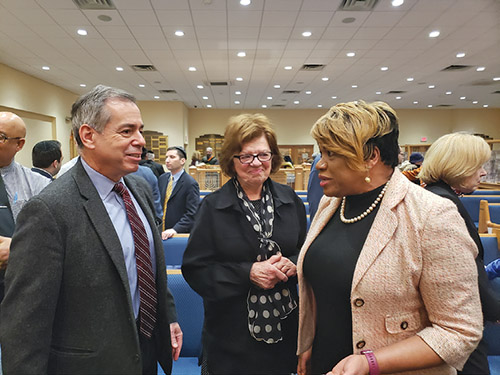
In the hope of creating a better understanding of a growing threat, the Central Jersey Jewish Public Affairs Committee (CJJPAC) hosted Mark Weitzman, Simon Wiesenthal Center director of government affairs, for an address to the Middlesex County community on “Anti-Semitism: The Evil in Our Midst” on Monday, February 10.
Weitzman is also a member of the official U.S. delegation to the International Holocaust Remembrance Authority (IHRA), where he chairs the committee on anti-Semitism and Holocaust denial and has been called “the architect” of the internationally recognized “Working Definition of Anti-Semitism,” which has been adopted by 41 countries, the United Nations, the U.S. State Department and over 20 states and 22 New Jersey towns.
Over 400 people filled the sanctuary at Congregation Ohav Emeth in Highland Park to learn more on the topic in the wake of a troubling rise in the number of attacks against Jews in the region. Attendees included Jewish residents from the entire spectrum of community synagogues, Highland Park Mayor Gayle Brill Mittler, five Highland Park borough council members, Assemblywoman Nancy Pinkin of New Jersey’s 18th district, Reggie Johnson of the Middlesex County prosecutor’s office and many others.
Joyce Leslie, of Highland Park, came to learn more about what is being done locally to fight anti-Semitism after recently attending an “extremely unsettling” presentation where vile accusations and lies were leveled against Israel. Rivka Steinberg, also of Highland Park, came to the presentation because “Jews should be informed.” Highland Park resident Sue Kheel said that it is important to be educated as to what various Jewish agencies are doing to protect Jewish citizens.
Rabbi Eliyahu Kaufman of Congregation Ohav Emeth started the program by thanking everyone for coming to confront the issue of anti-Semitism. He stated, “It is a sad truth that this talk is necessary.” He noted that in a time when many people alive today have firsthand knowledge of the horrors of the Holocaust, darkness has returned to Pittsburgh, Poway, Jersey City, Monsey and other places.
Rabbi Daniel Loew, head of school at Edison’s Rabbi Pesach Raymon Yeshiva (RPRY), read a letter from Steven Fulop, Jersey City mayor, who could not attend. Fulop, an alumnus of RPRY, noted how anti-Semitism has struck close to home in his town, our town, and across the river at Rutgers, as well as elsewhere in the area. He asserted that we must call out anti-Semitism early and aggressively.
Weitzman opened his presentation by asking the question, “Are we in a time similar to the 1930s Germany and the climate that led to the Holocaust in Europe?” After listing six reasons why the current time is different, he added that anti-Semitism has always been present in the United States but we are having a more visceral reaction to it now. Recent years have seen an increase in the severity and number of occurrences. Social media has changed the climate as has the legitimization of anti-Zionism in Congress. Rather than years separating serious incidents, the time frame has become months and weeks.
Manifestos of those preaching hate are readily available and transmitted on social media, thereby influencing others. In 2018 incidents of anti-Semitism on college campuses rose significantly and show no evidence of slowing down. The quality of Jewish life has been changed with safety and security guards present at houses of worship and schools—an idea that would have been unthinkable 10 years ago.
Weitzman said that there was anti-Semitism in North America even before there was a United States. As far back as 1554, Peter Stuyvesant did not want to allow Jews into what is now New York, and ordered them deported. Protests to the Dutch West Indian Company, Stuyvesant’s employer, resulted in the order being rescinded.
The IHRA, an intergovernmental organization, was determined to develop a definition of anti-Semitism that would be used as a global standard. The committee took three years and developed a definition that was adopted in 2014. The definition is multi-faceted and includes statements such as those holding Israel to a standard of behavior not expected or demanded of any other democratic nation; calling for or justifying harming Jews; and/or stating dehumanizing, demonizing or stereotypical allegations about Jews. The list of countries that have adopted the definition continues to grow, with the definition serving as a foundation to prevent crimes against Jews being defined as political speech. (The full statement can be found at https://www.holocaustremembrance.com/working-definition-antisemitism.)
Weitzman concluded his presentation by noting that the definition of anti-Semitism developed by IHRA specifically identifies the the BDS (Boycott, Divestment, Sanction) Movement as an anti-Semitic movement and that President Trump’s recent executive order protecting Jewish college students still maintains freedom of speech, but protects against hate speech. He also noted that anti-Semitism is present on both the far right and far left of American politics. It is the role of both political parties to call out anti-Semitism within their own parties.
Sue Dobkin of Highland Park came to hear an important topic and was gratified to see such a good presence of Jews from many affiliations, commenting, “It is good that we have joined together. It is sad that this is the reason.”
The full presentation can be viewed at: https://www.youtube.com/watch?v=W6f8CfjKBlE.
By Deborah Melman










